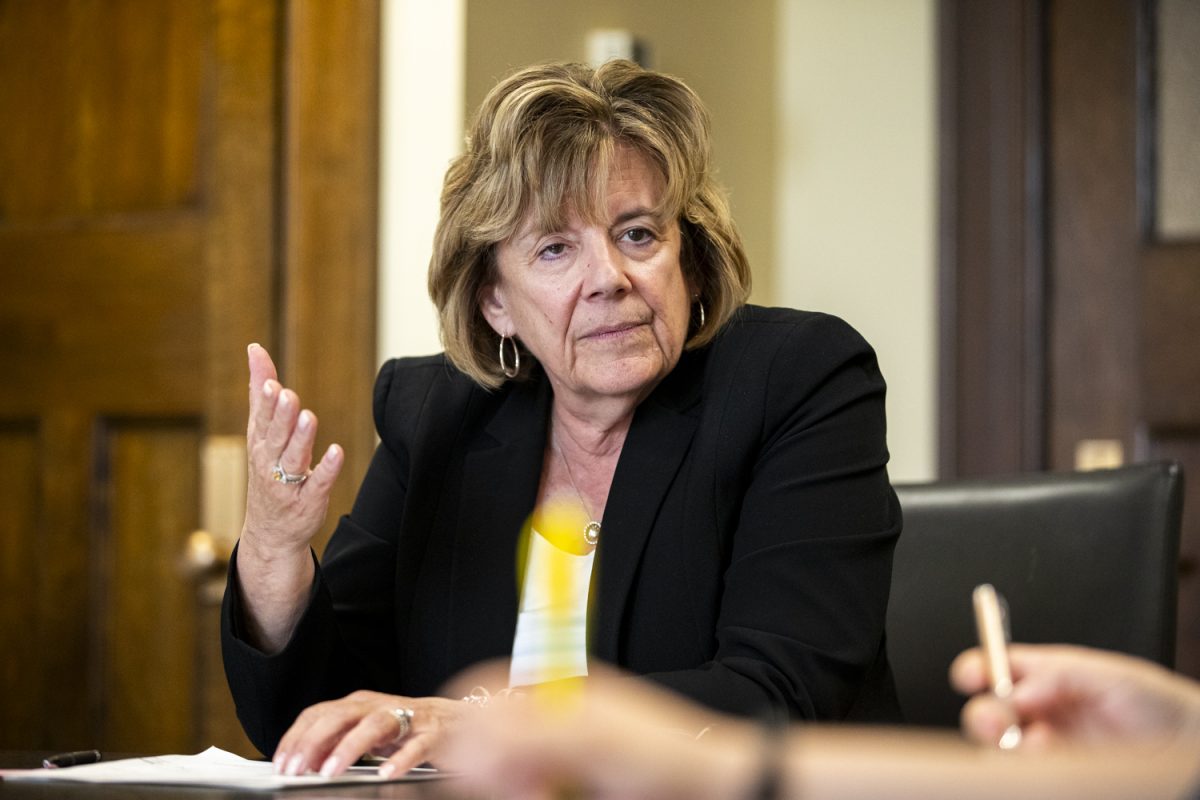University of Iowa President Barbara Wilson defended the university’s compliance with legislation barring Diversity, Equity, and Inclusion in a presentation to lawmakers Monday as the threat of a federal ban on the programs looms.
The defense came in response to questions during an Iowa House Education Appropriations Subcommittee meeting. In the meeting, Iowa public institutions’ presidents presented developments at each school and how the universities have used state funding, as reported by The Cedar Rapids Gazette.
Following the presentation, which touched on the UI’s rising enrollment and retention numbers and requests for increased health care funding, Wilson fielded questions from lawmakers.
Iowa Rep. Brooke Boden, R-Indianola, raised concerns about the university’s compliance with recent legislation striking down DEI programs at institutions receiving federal funding.
Boden said after reviewing university websites, she fears the UI is still non-compliant with legislation restricting DEI such as Senate File 2435, which prohibits higher education institutions from holding DEI offices.
She also mentioned President Donald Trump’s executive order targeting DEI programs for elimination in the federal government, which a federal judge recently blocked.
Gov. Kim Reynolds reminded Iowa’s public universities to ban DEI programming in a January letter following Trump’s initial federal ban, citing Senate File 2435.
Boden said she worries about a potential loss of funding in Iowa if the UI does not meet compliance standards.
RELATED: Bill banning all forms of DEI in city, county offices advanced by Iowa lawmakers
“As you know, we have hundreds of millions of dollars of federal money coming down the pike, that if we’re not willing to comply, that we’re going to miss out on in the state of Iowa,” Boden said. “So this is a major concern for me to still be seeing so much of that out there.”
The U.S. Department of Education also notified institutions receiving federal funding that they had 14 days to “cease using race preferences and stereotypes as a factor in their admissions, hiring, promotion, compensation, scholarships, prizes, administrative support, sanctions, discipline, and beyond” or risk losing funding via a letter on Feb. 14.
In response to Boden’s concerns, Wilson said the university is being mindful of the language it uses surrounding DEI and the university has taken measures to be compliant with legislation at the state level.
“We feel as though we have complied with the law, and we’re working really closely to reduce the number of personnel that we have,” Wilson said. “We’ve closed offices, we’ve gotten rid of every DEI committee in every department across every college. We have retained a central office, but we’ve eliminated about 11 positions in that central office, and it’s focused primarily on civil rights, access and opportunity.”
Wilson also clarified that there are no DEI-specific student success programs, adding that student success programs are not and were not housed in a DEI office or involved with the topic.
“We don’t have special programs or special leverages for certain students and not others,” Wilson said. “We’re trying to meet students where they are and ensure their success at the University of Iowa and define diversity in the broadest possible terms.”
Wilson recognized that diversity, equity, and inclusion have become “politically charged words,” but defended the need for diversity in a broad sense at the UI.
“For us, diversity still matters,” Wilson said. “And when I say the word diversity, I don’t mean just race or gender or sexuality. I’m talking about first-gen students, students from rural communities, students who have different religious backgrounds, students who are in the ROTC, our military veteran students.”
All of those types of students reflect a diverse experience at the UI, she said.
“I can’t imagine getting rid of the word diversity,” Wilson said. “Now, if you tell me I need to, I will, but it doesn’t actually reflect who we are. We welcome students from all backgrounds, from all regions, from multiple viewpoints and with different experiences, and what we say is, ‘You’re a Hawkeye now, come in, and we’re going to do what we have to do to make sure you get to graduation.’ That’s our commitment.”



